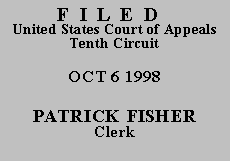

| LLOYD DEAN HARJO,
v.
STEPHEN W. KAISER, Warden,
(sued as Stephen Kaiser);
ATTORNEY GENERAL OF THE
STATE OF OKLAHOMA |
No. 98-5096
(D.C. No. 96-CV-1012-BU) |
Petitioner asserts that the district court erred when it denied him an opportunity to amend his petition for habeas relief to allege ineffectiveness of trial counsel, and that the court improperly rejected his proposed ineffective assistance claim on the merits. Petitioner also contends that the district court lacked jurisdiction to convict him of "riot," failed to conduct a de novo review of the magistrate's recommendation, and erroneously found that further state court litigation of his unexhausted claims would have been futile. Petitioner further argues that the district court improperly overturned the magistrate's dismissal of his assault charge and failed to declare a mistrial despite allegedly improper communications to the jury concerning petitioner's prior convictions.(1) Upon review of the pleadings and the record in this case, we reject all of these arguments.
The district court did not err when it denied petitioner's motion to amend his habeas petition. Fed. R. Civ. P. 15(a) permits amendment of pleadings with leave of the court and provides that "leave shall be freely given when justice so requires." We review a district court's denial of leave to amend for abuse of discretion. Walters v. Monarch Life Ins. Co., 57 F.3d 899, 903 (10th Cir. 1995).
The district court denied, as untimely, petitioner's motion to amend his petition to include a claim of ineffective assistance of trial counsel. That decision was not an abuse of discretion. Petitioner sought to amend his petition after the magistrate judge had already thoroughly reviewed the record and issued a twenty-nine page recommendation on the merits. At that stage in the litigation, the district court appropriately denied petitioner's motion.
The district court also denied petitioner's motion to amend on the ground that inclusion of petitioner's proposed amendment would have been futile. Petitioner sought to argue that his trial counsel rendered constitutionally ineffective assistance because trial counsel failed to impeach the credibility of Officer Panke, whom, petitioner asserts, offered inconsistent testimony regarding the identity of his assailant. Petitioner contends that but for trial counsel's failure to impeach Officer Panke, the jury might not have convicted petitioner of assault. This, petitioner believes, satisfies the test for establishing ineffective assistance of counsel set forth in Strickland v. Washington, 466 U.S. 668, 687 (1984).
A review of the record, however, reveals that at both the preliminary hearing and the trial, Officer Panke consistently identified petitioner as one of his assailants. Accordingly, there is no reasonable probability that had petitioner's attorney questioned Officer Panke about his prior testimony, the jury would have found petitioner innocent of the assault charge. Petitioner therefore does not satisfy the requirements of Strickland, 466 U.S. at 687-88 (holding that in order to prove ineffective assistance of counsel, a defendant must establish that counsel's performance was deficient and that the deficient performance prejudiced the defense).
Nor is petitioner entitled to habeas relief on the grounds that the district court lacked jurisdiction to convict him of "riot" under Oklahoma law. In support of that argument, petitioner points out that only two of the defendants in this matter were convicted. Oklahoma law defines riot as a crime involving the use of force or violence "by three or more persons acting together and without authority of law. . . ." See Okla. Stat. Ann. tit. 21, § 1311 (1993). However, when the prosecution establishes beyond a reasonable doubt the elements of the crime, it need not convict all three defendants to sustain the conviction of any individual defendant. Petitioner's citation to Simmons v. Territory, 11 Okla. 574, 69 P. 787 (Okla. 1902), provides no support for his argument to the contrary. Rather, the Simmons court held that if defendants are tried separately, the conviction of one is not invalidated by the acquittal of another. See 69 P. at 788.
We also reject petitioner's argument that the district court erroneously failed to make a de novo determination of those portions of the magistrate's report to which petitioner objected. Petitioner presents no evidence or argument to rebut the district court's assertion that it undertook a de novo review of those issues.
Finally, for the reasons adopted by the district court, we reject petitioner's arguments that the district court erred when it concluded that further state court litigation of petitioner's unexhausted claims would be futile and when it overturned the magistrate judge's dismissal of the assault charge. For the reasons adopted by the district court, we also affirm that court's decision to deny petitioner's request for a mistrial and for habeas relief based on allegedly improper communications to the jury concerning petitioner's prior convictions.
AFFIRMED. The mandate shall issue forthwith. ENTERED FOR THE COURT
Carlos F. Lucero
Circuit Judge
*. The case is unanimously ordered submitted without oral argument pursuant to Fed. R. App. P. 34(a) and 10th Cir. R. 34.1.9. This order and judgment is not binding precedent, except under the doctrines of law of the case, res judicata, and collateral estoppel. The court generally disfavors the citation of orders and judgments; nevertheless, an order and judgment may be cited under the terms and conditions of 10th Cir. R. 36.3.
1. Petitioner does not argue on appeal that his sentence is excessive, and so we do not reach that issue here.